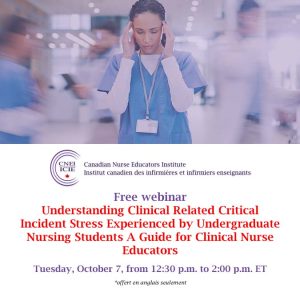 Date and Time:
Date and Time:
October 7th, 2025
NT 2:00 PM – 3:30 PM
AT 1:30 PM – 3:00 PM
ET 12:30 PM – 2:00 PM
CT 11:30 AM – 1:00 PM
MT 10:30 AM – 12:00 PM
PT 9:30 AM – 11:00 AM
Webinar Description:
Undergraduate nursing students are at risk of exposure to clinical related critical incidents (Harvey & Carter-Snell, 2022). Critical incidents are unexpected events that have the potential to compromise typically used coping mechanisms and may result in distress (Everly & Mitchell, 1999, 2008). Critical incidents may lead to critical incident stress or a range of physiological, psychological and existential responses (Mitchell, 2012). Nursing students have described their experiences of critical incident stress as having impacted their self-confidence, self-worth, and compromised personal as well as professional identities (Harvey & Carter-Snell, 2022; Harvey et al., 2024). The risk of exposure to critical incidents coupled by the potential for re-traumatization from past personal or childhood experiences (Gilroy et al., 2024) adds complexity to teaching and learning in the clinical environment (Harvey & Carter-Snell, 2024). Providing clinical nurse educators with tools underpinned by a trauma-informed approach (TIA) to facilitate timely and supportive conversations with students who have experienced clinical related critical incidents are imperative. Supporting nursing students after a clinical related critical incident requires educators to be flexible and adaptable by offering individualized assistance to learners.
Speakers:
Giuliana Harvey is an Associate Professor in the School of Nursing and Midwifery at Mount Royal University (MRU) (Calgary, Alberta). Giuliana teaches widely across the Bachelor of Nursing program at MRU supporting learners in the classroom, lab, clinical, and simulation settings. She has developed expertise in simulation through participation in numerous international simulation training sessions from well-known academic institutions, and successful achievement of international certification as a Certified Healthcare Simulation Educator. She was awarded and completed a research fellowship from the International Nursing Association for Clinical Simulation and Learning where she explored nursing students’ experiences of psychological harm from simulation-based learning experiences. This project aligned well with her program of research which is focused on undergraduate nursing student stress and well-being. She has conducted most of her research in the area of clinical related critical incident stress in the context of undergraduate nursing students.
Jaime Gallaher is an experienced emergency nurse and dedicated nursing educator with over 15 years in nursing education. She holds a Master of Nursing Education & Leadership from the University of British Columbia and has a deep passion for experiential learning, particularly in simulation-based education. Since 2016, Jaime has played a significant role in advancing simulation practices in both academic and clinical settings. As a recognized expert in simulation-based learning (SBL), Jaime has presented at numerous conferences, sharing insights on in-situ simulation, tele-simulation for rural and remote communities, and effective debriefing strategies for healthcare professionals. She has also contributed to faculty development by teaching with the “Debriefing Academy” and is a strong advocate for the PEARLS healthcare debriefing framework as a structured approach to simulation debriefing. Beyond simulation, Jaime is passionate about clinical event debriefing, emphasizing the importance of reflective learning in healthcare. Throughout her career, she has led multiple workshops and discussions,


